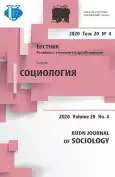“New nationalism” and the issue of nations in the interpretation of American social theorists
- Authors: Gorshkov M.K.1, Bagramov E.A.1
-
Affiliations:
- Federal Center of Theoretical and Applied Sociology of the RAS
- Issue: Vol 20, No 4 (2020)
- Pages: 733-751
- Section: Theory, Methodology and History of Sociological Research
- URL: https://journal-vniispk.ru/2313-2272/article/view/322877
- DOI: https://doi.org/10.22363/2313-2272-2020-20-4-733-751
- ID: 322877
Cite item
Full Text
Abstract
The article considers the so-called new nationalism that has been developing in the United States and other Western countries since the last decades of the 20th century as a system of ideas about nations, sovereignty, racial and national relations, and also currents of nationalism. Recent forecasts of the ideologists of globalism about the inevitable departure from the political scene of nation-states, nations and nationalism are opposed by the contemporary nationalism which became a real political factor, primarily in the United States. The authors show the variety of concepts of nationalism, which allows its supporters in the United States to follow both openly chauvinistic ideas and liberal ideas of solidarity that makes up the nation. Among the reasons for the rise of nationalism, the authors consider the interaction of two trends in the public-political life - politicization of ethnicity and ethnicization (or nationalization) of politics. The authors believe that the emphasis on ethnic nation and ethnic nationalism (as opposed to civil nation and civil nationalism) reflects the exacerbation of inter-ethnic tensions in the United States and other Western countries. Based on the analysis of the new nationalism, the authors distinguish its right direction, whose supporters nominally renounce Nazism and racism but promote similar ideas, and a moderate liberal direction which often equates nationalism with patriotism. Representatives of both trends appeal to national interests and values of the nation’s historic core, and criticize migration policy and multiculturalism. In addition to ‘white’ racism and its evolution, the article considers the scope of nationalism and patriotism of African-American movements, in particular “Black Lives Matter” and the results of the study of the dual consciousness of African Americans as combining the concept of ‘nation within a nation’ and a new, completely American identity. Despite many American theorists’ idea of the absence of the American nation as such, the authors consider the concept of a new identity of the American nation, which M. Lind defines as a unity of language and culture, regardless of the racial composition, i.e. as an expression of liberal nationalism and a renewed concept of the ‘melting pot’. Lind and his colleagues believe that the factor of the current split of the American nation is not racial or ethnic confrontation (‘Balkanization’) but the social gap between rich and poor. The authors consider the criticism of the policy of the American ruling class as a means for the sociological study of the racial problem and for the development of ways for solving it.
Keywords
About the authors
M. K. Gorshkov
Federal Center of Theoretical and Applied Sociology of the RAS
Author for correspondence.
Email: director@isras.ru
доктор философских наук, академик Российской академии наук, директор Федерального научно-исследовательского социологического центра Российской академии наук
Krzhizhanovskogo St., 24/35-5, Moscow, 117218, RussiaE. A. Bagramov
Federal Center of Theoretical and Applied Sociology of the RAS
Email: ebagramov@gmail.com
доктор философских наук, главный научный сотрудник
Krzhizhanovskogo St., 24/35-5, Moscow, 117218, RussiaReferences
- Lieven A. Anatomiya amerikanskogo natsionalizma [America: Right or wrong? Anatomy of American nationalism]. Pro et Contra. 2004; 8 (3) (In Russ.).
- McInerney D. SShA. Istoriya strany [USA. History of the Country]. Moscow–Saint Petersburg; 2009 (In Russ.).
- Panov P.V. Natsionalizm [Nationalism]. Identichnost: Lichnost, obshchestvo, politika. Entsiklopedicheskoe izdanie. Otv. red. I.S. Semenenko. Moscow; 2017 (In Russ.).
- Sidorina T.Yu, Polyannikov T.L. Natsionalizm: teorii i politicheskaya istoriya [Nationalism: Theories and Political History]. Moscow; 2006 (In Russ.).
- Sidorchik A. “Evropeoidy umnee”. Pervootkryvatelya struktury DNK nakazali za rasizm [“Caucasoids are smarter”. Discoverer of DNA structure punished for racism]. URL: https://aif.ru/society/science/evropeoidy_umnee_pervootkryvatelya_struktury_dnk_nakazali_ za_rasizm (In Russ.).
- Sociologicheskaya Entsiklopediya [Sociological Encyclopedia]. Vol. 2. Moscow; 2003 (In Russ.).
- Huntington S.P. Kto my?: vyzovy amerikanskoj natsionalnoj identichnosti [Who are We? The Challenges to America’s National Identity]. Moscow; 2004 (In Russ.).
- Haywood H. Osvobozhdenie negrov [Negro Liberation]. Moscow; 1950 (In Russ.).
- Yak B. Natsionalizm i moralnaya psikhologiya soobshhestva [Nationalism and the Moral Psychology of Community]. Moscow; 2017 (In Russ.).
- Blain K.N. Violence in Minneapolis is rooted in the history of racist policing in America. URL: https://www.washingtonpost.com/outlook/2020/05/30/violence-minneapolis-is-rooted-history-racist-policing-america.
- Denworth L. A civil rights expert explains the social science of police racism. URL: https://www.scientificamerican.com/article/a-civil-rights-expert-explains-the-social-science-of-police-racism.
- Ignatieff M. Blood and Belonging: Journeys into the New Nationalism. New York; 1995.
- Jonson M.E. The paradox of black patriotism: Double consciousness. Ethnic and Racial Studies. 2018; 41 (11).
- Lind M. The Next American Nation: The New Nationalism and the Fourth American Revolution. New York; 1995.
- Patterson O. The long reach of racism in the U.S. URL: https://www.wsj.com/articles/the-long-reach-of-racism-in-the-u-s-11591372542.
- Sakamoto A., Wang S.X. The declining significance of race in the 21st century: A retrospective assessment in the context of rising class inequality. Ethnic and Racial Studies. 2015; 38 (8).
- Shafer B. Faces of Nationalism: New Realities and Old Myths. New York; 1972.
- The Globalization of World Politics: An Introduction to International Relations. New York; 2008.
- Theodorson G.A., Theodorson A.G. A Modern Dictionary of Sociology. New York; 1969.
- Turley S. The New Nationalism: How the Populist Right is Defeating Globalism and Awakening a New Political Order. Newark; 2018.
Supplementary files









